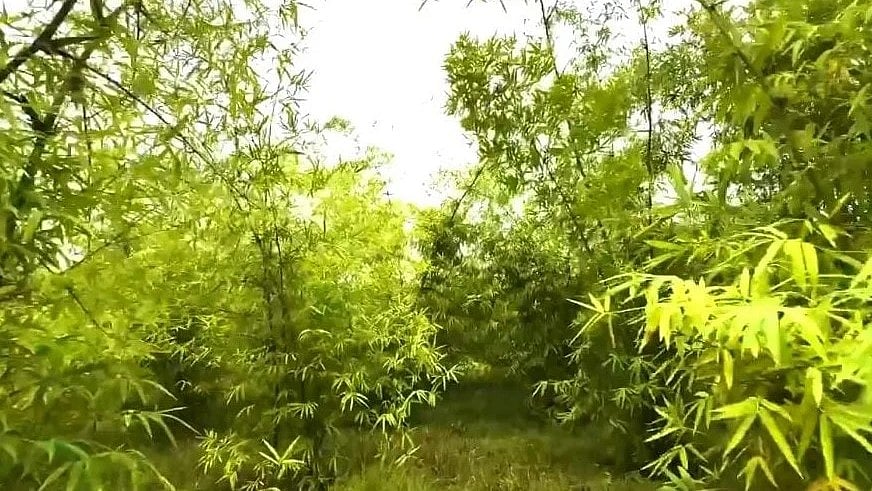
In about four years since then, 25 acres of arid desert land in the village has been turned into a greenery.
Credit: Special arrangement
Guwahati: Nichla Mandwa village in Rajasthan's Udaipur district tried many plants to rejuvenate its arid land before trying the Jati Bah (bambusa tulsa), a climate resilient bamboo species, found more than 2,200 kms away in Assam.
It was in June 2021, when the fear over the Covid pandemic was still not over. Braving the Covid fear and the transportation challenges, Khadi and Village Industries Commission (KVIC) and National Council for Civil Liberties (NCCL), an Ahmedabad-based NGO, transported 5,500 saplings of jati bah from a private nursery near Guwahati and planted them in the village. In about four years since then, 25 acres of arid desert land in the village has been turned into a greenery.
The village land has not only been rejuvenated but also now houses squirrels, peacocks, chameleons, butterflies, dragonflies, grasshoppers, and other creatures teeming around the trees on the once arid plot of land.
"Transportation of the plants was challenging as the clouds of the Covid-19 pandemic were still looming around. But we managed it," said Sukamal Deb, who then served as deputy chief executive officer of KVIC, Northeastern Region.
With support from Local Area Development Fund of Local MP, Arjun Lal Meena, a mass plantation was carried out with the involvement of a local woman sarpanch, MLA, and others.
Deb said the initiative began under the leadership of V K Saxena, the present Lieutenant Governor, Delhi and the then Chairman of KVIC. It began after Prime Minister Narendra Modi on June 14, 2021, declared India’s commitment to land degradation neutrality, aiming to restore 26 million hectares of degraded land by 2030. "As part of the plan, Nichla Mandwa village was selected following Saxena's visit to the village," Deb said.
"The jati bah were specially chosen for its resilience as it consumes less water, possesses high-water retention and helps raise water tables apart from emitting 30 per cent more oxygen. Fruit bearing trees such as amla, guava, mango and moringa were chosen to introduce new fauna-mammals, reptiles, and arthropods, apart from enriching the floral diversity," he said. A solar powered borewell was installed for watering the plants.
In a recent social media post, Saxena said, "The aim was not only restoration and reclamation of degraded barren land, but also creating opportunities for livelihoods and local employment. Bamboo provides raw materials for cottage industries like incense sticks (Agarbatti), kites, and furniture. Its availability in the vicinity will enable such units to generate employment locally."
Nichla Mandwa stands as a testimony to how a low-cost project can foster an ecosystem that boosts scarce natural resources, enriches people's lives, and counters the larger threat of global warming. This serves as a replicable model for healing vast degraded landscapes and creating sustainable futures not only for India but for the entire globe, Saxena said.